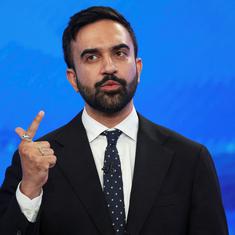RBI Deputy Governor Viral Acharya calls for independent fiscal council to monitor deficit targets
Acharya, who will serve his last day in the post on Tuesday, made the remark in a speech last year.

Reserve Bank of India Deputy Governor Viral Acharya has called for the formation of an independent “fiscal council” to keep check on how the government manages its fiscal deficit targets. The speech was published on Monday by Federal Bank, which had invited Acharya to deliver the lecture in Kochi in November.
In May, Acharya submitted his resignation six months before his term was to end. He will serve his last day on Tuesday.
Acharya said the fiscal council could monitor the government’s performance on its fiscal targets and roadmap by “assessing regularly the progress in fiscal consolidation or lack thereof, and providing standardised reports on the displacement of fiscal deficits into off-balance sheet borrowings”. Setting up such a body was among the recommendations of the 14th Finance Commission and the committee set up to review the Fiscal Responsibility and Budget Management Act in 2017.
Apart from improving adherence to targets, the council could “reduce the ease with which goalposts are shifted to future”, Acharya said in his speech.
Acharya also made a case for reducing the government borrowing and making more resources available for the private sector. He also suggested that the government raise its share of capital expenditures and consider cutting back on subsidies and programmes that are not delivering long-run growth. Instead, the government could focus on public goods such as education, health and infrastructure, Acharya said.
The government’s fiscal deficit in recent years has been a matter of concern. For the 2019-’20 financial year, the Centre has set a fiscal deficit target of 3.3% of the Gross Domestic Product.
“When it comes to borrowings and fiscal deficit, governments should take inspiration from Sachin Dev Burman’s sublime but masterfully minimalistic music for the songs of Pyaasa; Burman da proved that less can indeed be more by crowding in everyone else, so can the government!” Acharya said.
Weeks before the speech, Viral Acharya had created a storm by makinf remarks that were indicative of differences between the central bank and the Union finance ministry. He had warned that undermining a central bank’s independence could be “potentially catastrophic”, and said governments that do not respect it sooner or later incur the wrath of financial markets.









